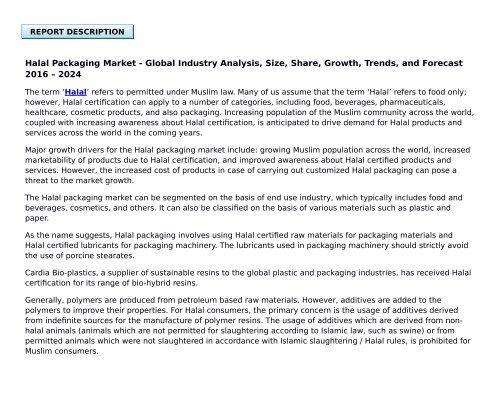Halal Packaging Market
You also want an ePaper? Increase the reach of your titles
YUMPU automatically turns print PDFs into web optimized ePapers that Google loves.
REPORT DESCRIPTION<br />
<strong>Halal</strong> <strong>Packaging</strong> <strong>Market</strong> - Global Industry Analysis, Size, Share, Growth, Trends, and Forecast<br />
2016 – 2024<br />
The term ‘<strong>Halal</strong>’ refers to permitted under Muslim law. Many of us assume that the term ‘<strong>Halal</strong>’ refers to food only;<br />
however, <strong>Halal</strong> certification can apply to a number of categories, including food, beverages, pharmaceuticals,<br />
healthcare, cosmetic products, and also packaging. Increasing population of the Muslim community across the world,<br />
coupled with increasing awareness about <strong>Halal</strong> certification, is anticipated to drive demand for <strong>Halal</strong> products and<br />
services across the world in the coming years.<br />
Major growth drivers for the <strong>Halal</strong> packaging market include: growing Muslim population across the world, increased<br />
marketability of products due to <strong>Halal</strong> certification, and improved awareness about <strong>Halal</strong> certified products and<br />
services. However, the increased cost of products in case of carrying out customized <strong>Halal</strong> packaging can pose a<br />
threat to the market growth.<br />
The <strong>Halal</strong> packaging market can be segmented on the basis of end use industry, which typically includes food and<br />
beverages, cosmetics, and others. It can also be classified on the basis of various materials such as plastic and<br />
paper.<br />
As the name suggests, <strong>Halal</strong> packaging involves using <strong>Halal</strong> certified raw materials for packaging materials and<br />
<strong>Halal</strong> certified lubricants for packaging machinery. The lubricants used in packaging machinery should strictly avoid<br />
the use of porcine stearates.<br />
Cardia Bio-plastics, a supplier of sustainable resins to the global plastic and packaging industries, has received <strong>Halal</strong><br />
certification for its range of bio-hybrid resins.<br />
Generally, polymers are produced from petroleum based raw materials. However, additives are added to the<br />
polymers to improve their properties. For <strong>Halal</strong> consumers, the primary concern is the usage of additives derived<br />
from indefinite sources for the manufacture of polymer resins. The usage of additives which are derived from nonhalal<br />
animals (animals which are not permitted for slaughtering according to Islamic law, such as swine) or from<br />
permitted animals which were not slaughtered in accordance with Islamic slaughtering / <strong>Halal</strong> rules, is prohibited for<br />
Muslim consumers.
















